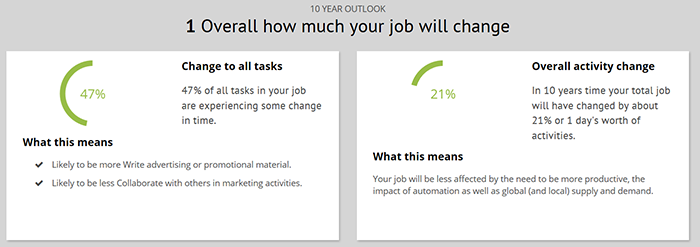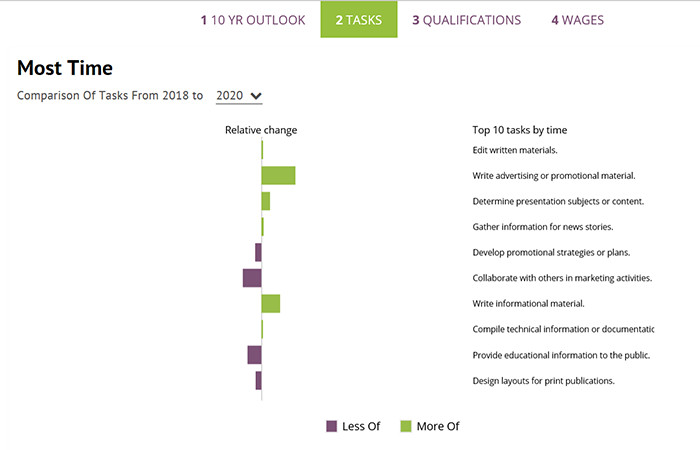The University of New England has released a tool that allows you to see how much your job will be impacted by technology over the next decade.
In an Australian first, the university has worked with strategy and economics consultants AlphaBeta to develop an online tool that calculates not only your exposure to automation and other sources of change in your current job, but also how your job will change over the coming decades.
Director of Marketing at UNE, Anthony Smith, who commissioned the tool explains that it was something that hadn’t been done before. “Our market research shows that many people are concerned about the security of their careers as new technology like automation and AI penetrates further into the workplace. The data about this tends to be very difficult to relate to as an individual.
Future of Work Predictor is able to look beyond the likelihood of redundancy from automation to examine transformation of industries and determine ways individual jobs will change.
Radio is among the industries covered by the predictor with announcers, journalists, presenters, producers, EPs, account managers, technicians and more covered.
If you want to find out if you’re likely to be replaced by a robot, the link is here.
For the time being I appear to be safe, though the focus of my job is expected to change.


How to get a job in radio – our tips:
Step 1. Work out what you want to do – announcing, audio mixing, news, sales, something else? Don’t just think that the only jobs are announcing jobs.
Step 2. Visit some radio stations and take a look. Talk to radio people, read radio publications like radioinfo.com.au.
Step 3. Get involved as a volunteer at a community or campus radio station. Australian list of stations here, US Campus stations here.
Step 4. At this stage think about formal training. Are you a high school graduate – if so maybe do a uni communications or media degree with a strong practical radio component in it. Check out the lecturers – are they people who have really worked in radio or did they just learn it academically?
Step 5. Of go to one of the specialist radio training institutes such as AFTRS or TAFE in Australia. USA Radio courses. In the UK there are many universities wth radio courses and the BBC also has a training academy.
Step 6. Whatever courses you do, keep doing your volunteer radio show on community/campus radio and get enough good breaks to make a demo tape (yes, we know it’s no longer on tape, but that is still what radio people call it).
Step 7. What’s in a demo? No more than 5 minutes. Your best break first (give the employer a reason to listen longer). Showcase various things you can do, don’t just put in the same type of content. If applying for other specialist roles such as news or copywriting, include separate segments with news reads and attach advert or news scripts. Label your files with your name in the file name
Step 8. If you want a job in a capital city remember you will be competing with the best in the business who all want to work in a major market. You may need to start at the bottom if you want to work in a big station… or
Step 9. Take the leap and go to a small town to get your start. You will be a ‘big fish in a small pond,’ whcih will teach you a lot fast. You will also get to experience many job roles.
Step 10. As you progress, take control of your career, look for opportunities, say ‘yes’ to challenges, and move around to progress.
Step 11. Read Making Radio.
Good luck!


